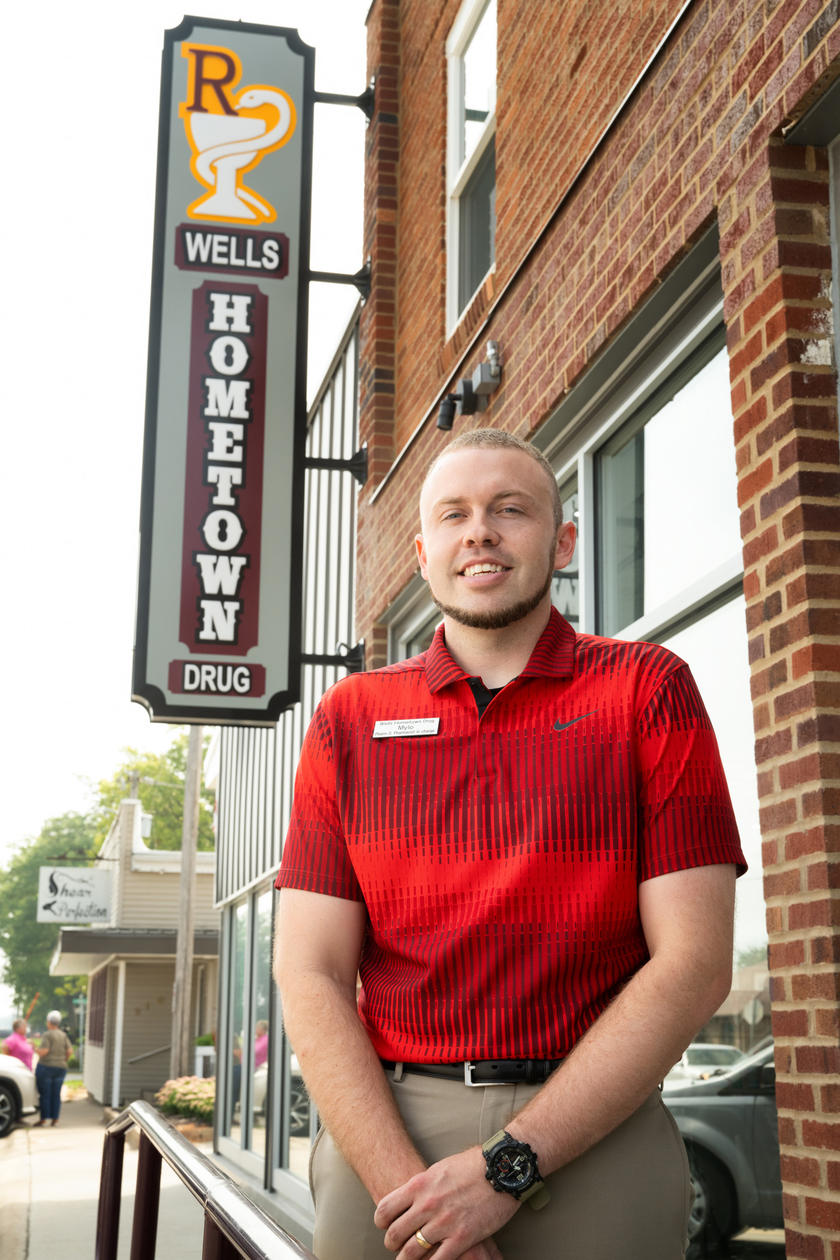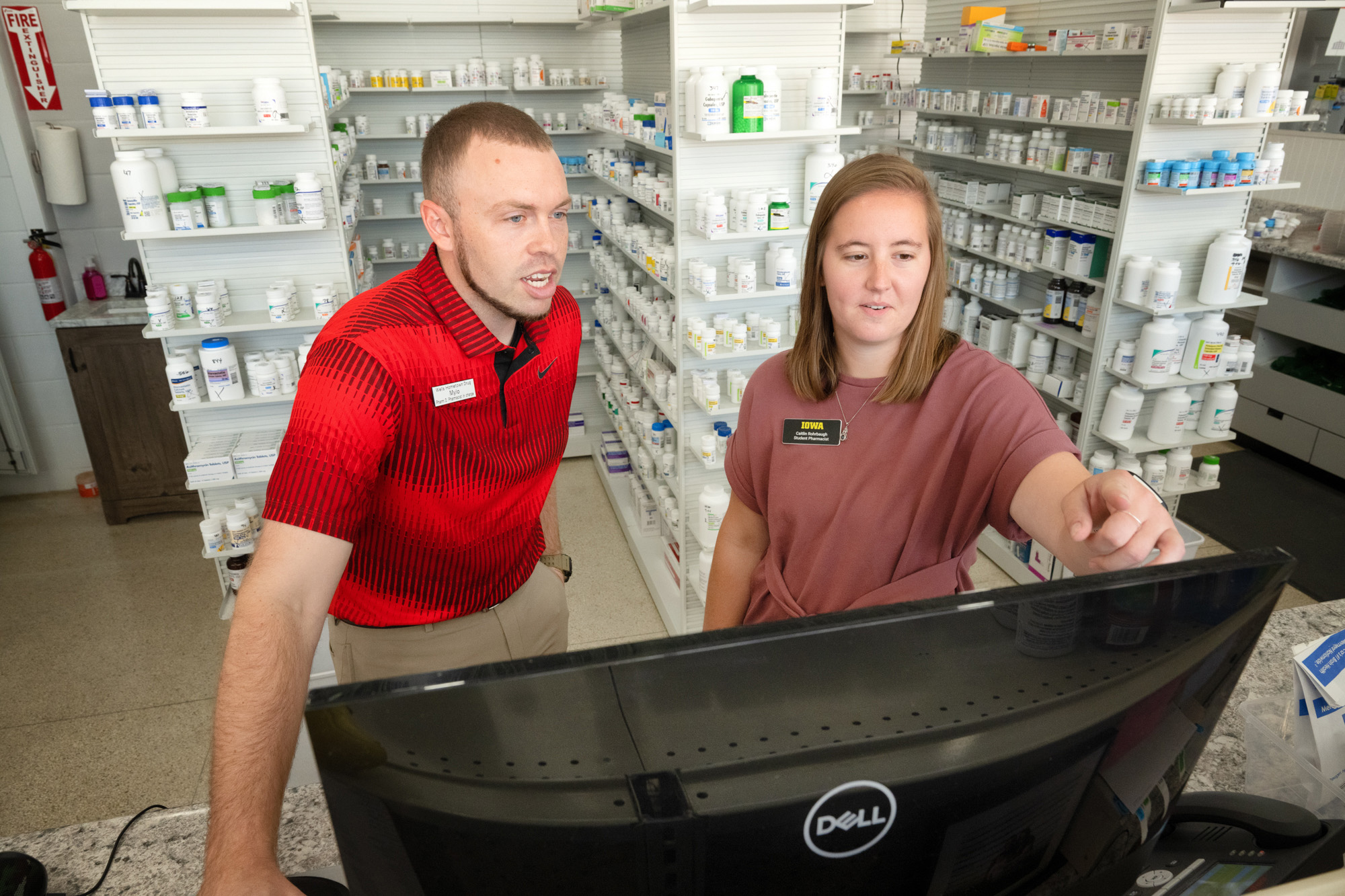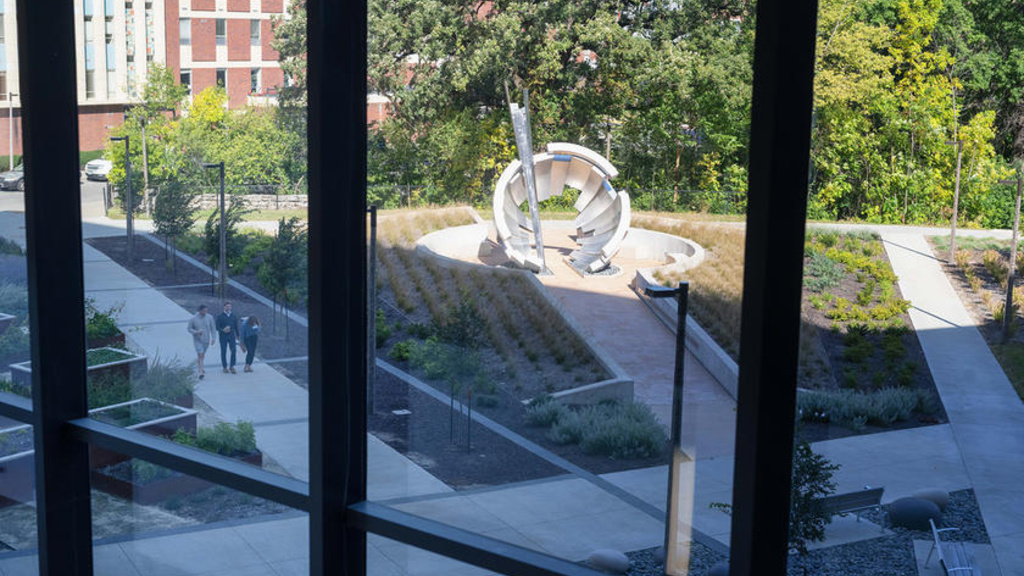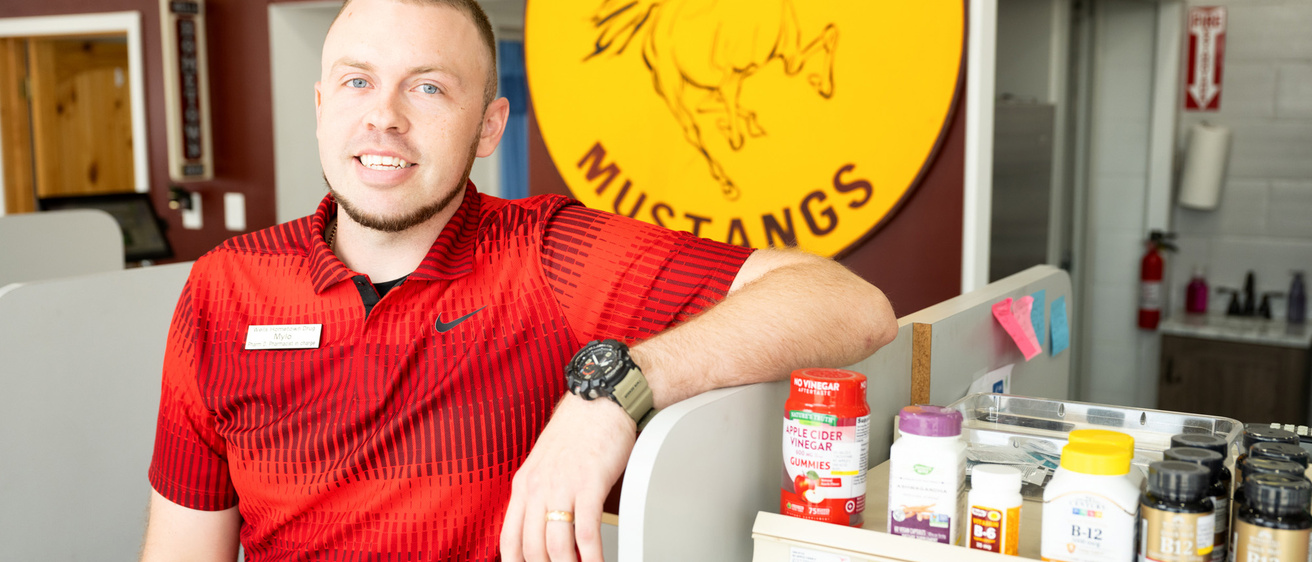Mylo Wells always knew he wanted to return to his Iowa hometown as a pharmacist. The University of Iowa gave him the skills he needed to serve his community and open his own pharmacies.
Story: Emily Nelson
Photography: Justin Torner
Published: Aug. 30, 2023
When Mylo Wells graduated in May 2018 from the University of Iowa College of Pharmacy, he had a five-year goal: to open his own pharmacy near where he grew up.
He accomplished it in six months.
Wells Hometown Drug opened in December 2018 in Bloomfield, the southeast Iowa town in which he went to high school and just miles from his family’s dairy farm in Milton, Iowa.
“We’re providing a really high level of pharmacy care, and I feel good about doing that because I grew up around here, and I know that it’s affecting people who helped me when I was growing up,” Wells says. “That means a lot to me.”
Wells says the education and experience he received at Iowa prepared him to hit the ground running.
“I graduated with a lot of clinical skills that some other colleges of pharmacy don’t provide. That gave me a ton of knowledge and confidence going forward,” Wells says. “I also appreciated that we often talked about current events in pharmacy school because that really helped me when I was coming up with a business plan to know what the landscape was. I had the background to know what and where to research.”
Wells was introduced to the pharmacy field early in life. His mom, Jana Zeitler, is a pharmacist, and he worked with her in high school.
“I really enjoyed getting to know and developing relationships with our patients,” Wells says. “I liked the idea that I could help take care of them. My favorite part of the job is still forming individual relationships with all of our patients. I try to greet everyone that walks through our doors.”
After completing all the necessary pre-pharmacy coursework at Iowa State University, Wells says he chose the University of Iowa’s College of Pharmacy because of its reputation and because he felt it would be the best school to prepare him for owning his own pharmacy.

Mylo Wells says he and his wife, who is a physical therapist in Bloomfield, always planned to return to their hometown, where they are now raising their children, Fredrick, 2, and Isaiah, 3 months.
Wells went to work after graduation at a pharmacy in Keosauqua, Iowa, but soon learned that a chain pharmacy was closing in nearby Bloomfield. He and his wife, Jackie, who is also from Bloomfield and graduated from the University of Iowa Department of Physical Therapy and Rehabilitation Science in 2016, decided to seize the opportunity.
“Every night after work, I worked on this,” Wells says. “It was a wild few months. We started with zero patient files, but now we’ve got about 6,000 patients.”

Caitlin Rohrbaugh, a fourth-year University of Iowa College of Pharmacy student from Laurens, Iowa, completed a five-week rotation at Wells Hometown Drug during the summer. She says she was particularly interested in doing a rotation with Mylo Wells because, like him, she aspires to own her own pharmacy one day.
“I graduated with a lot of clinical skills that some other colleges of pharmacy don’t provide. That gave me a ton of knowledge and confidence going forward.”
Wells says he wanted to go beyond just the dispensing of medications and focus on offering more clinical services, which he felt were lacking in the area. This includes coordinating with physicians to optimize medication choice and dosage, monitoring patients to evaluate the effectiveness of prescribed medications, and educating patients about their treatment regimens.
The pharmacy also works with the local hospital to provide in-patient monitoring and pharmacy care. Wells credits an advanced pharmacy practice experience (APPE), or rotation, at University of Iowa Hospitals & Clinics for inspiring the unique relationship.
“It’s a newer model of practice, and I knew when I graduated I wanted to bring that model here,” Wells says. “We are a community pharmacy like you’re used to seeing, but on the back end, we’re also remotely monitoring patients who are in the hospital. When they go home from the hospital, the transitional care is really solid because of the relationships we have already formed. That was a big focus at Iowa while I was on rotation, so it was nice to bring that in.”
Wells says his rotations during his fourth year at Iowa also provided him valuable mentors, including many Iowa alumni across the state who offered him support and advice after graduation as he opened his first pharmacy.
He is paying that support forward by acting as a preceptor for the Iowa College of Pharmacy, hosting rotations for student pharmacists at Wells Hometown Drug.
“I try to show them everything that you can do as a pharmacist,” Wells says. “I show them all the clinical things that we can do, and I also explain to them the business behind all this. So, I will break out my numbers and show them all to them. I’m very transparent about that because I feel like they need to see that stuff to truly learn.
“I also try to be a resource for them going forward so if they ever get into a situation where they want to open a pharmacy or want to know more about being a manager, they can reach out to me.”
Wells also has stayed connected to his alma mater through working with faculty who are conducting research, including participating in studies related to blood pressure, insurance, and opioids.
A few years after Wells opened his pharmacy in Bloomfield, he learned the pharmacy he had worked at in Keosauqua was for sale and at risk of closing. Afraid the community would be without a pharmacy, he decided to open a second Wells Hometown Drug location.
Today, the two locations employ 25 people—including Wells’ mom. Wells says he enjoys working with her again, although this time as a fellow pharmacist.

Did you know?
Doctoral students at the UI College of Pharmacy:
- Take classes in a state-of-the-art facility built in 2020.
- Collaborate with expert health care providers at UI Hospitals & Clinics, the state’s largest academic medical center.
- Are part of a program that is ranked No. 18 by U.S. News & World Report among 143 programs nationwide.
Wells says he and his wife, who is a physical therapist in Bloomfield, always planned to return to their hometown, where they are now raising their children, Fredrick, 2, and Isaiah, 3 months.
“We saw the level of health care that was available in Ames and Iowa City, and we wanted to bring that back here,” Wells says. “We wanted our families and our friends—and really just everyone—to have access to that level of care. It’s very rewarding to practice in small towns like these. I’ll see my patients at the grocery store, and they’ll chat with me about their meds. We may not have gotten that in a bigger city.”
